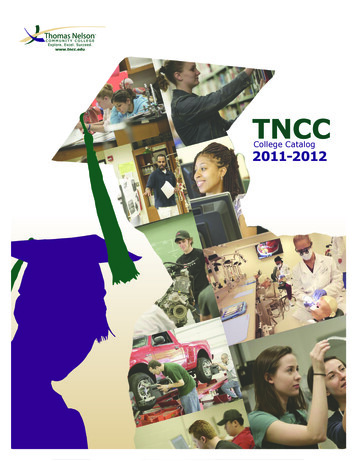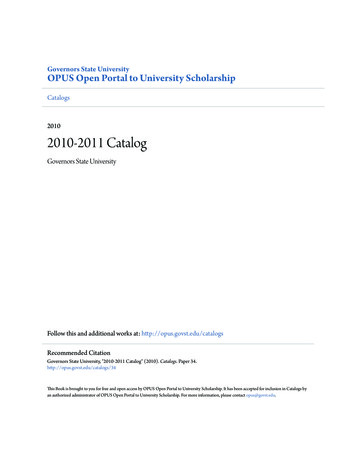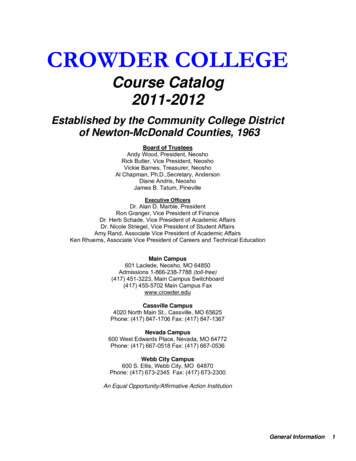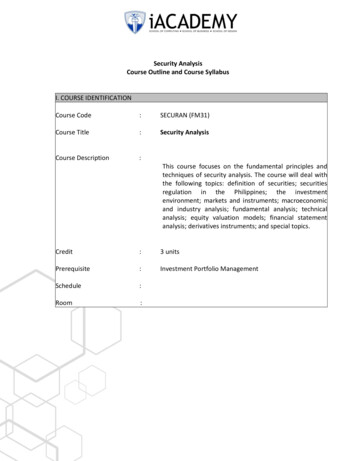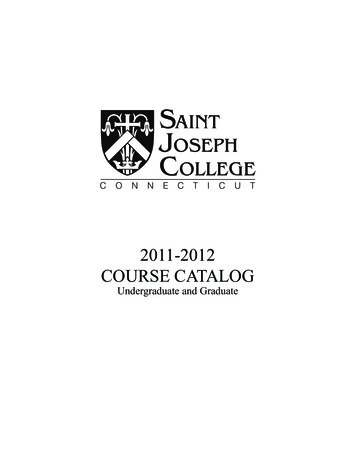
Transcription
2011-2012COURSE CATALOGUndergraduate and Graduate
TABLE OF CONTENTSAccreditation . 3Statement of Non-Discrimination . 3About Saint Joseph College . 4Academics . 7Academic Programs . 7Organization of the College . 8Other Academic Programs . 8Campus Services and Student Life. 9Campus Services . 9Student Life . 13Academic Calendars . 15Admissions . 16Undergraduate Admission. 16Graduate Admission. 24Veterans and Reservists . 25Tuition and Fee Schedule 2011-2012 . 26Undergraduate . 26Graduate Tuition . 29Professional Programs Tuition . 29Tuition Payment Options for Undergraduates & Graduates . 30Refund Policy on Tuition & Fees. 31Student Financial Aid . 32Undergraduate Student Financial Aid . 32How is Financial Aid Need Determined? . 32Scholarships Review . 32Graduate Student Financial Aid . 33Veterans Benefits: The Yellow Ribbon Program Undergraduate. 33Financial Aid Application Process – Apply Online . 33Policy for Disbursement of Financial Aid Funds. 34Return of Title IV Funds . 34Additional Information. 34Registration . 35Undergraduate and Graduate. 35Continuing Education. 38Degree Requirements. 40Bachelor’s Degree . 40Second Bachelor’s Degree . 40General Education . 40Writing Portfolio . 43Comprehensive Evaluation . 44Thesis . 44GPA to Graduate . 44Application for a Degree . 45Time to Degree. 45Graduation with Honors . 45Commencement. 45Schools, Departments and Programs. 46School of Education . 46Education Department . 471
Physical Education and Sports Studies Department. 66School of Graduate and Professional Studies . 67Business Administration Department. 68Counseling and Family Therapy Department. 72Human Development and Family Studies Department . 76Social Work and Latino Community Practice Department. 83School of Health and Natural Sciences . 89Biology Department . 90Chemistry Department. 93Mathematics Department. 98Nursing Department . 100Nutrition Department. 107School of Humanities and Social Sciences . 115English Department . 116Fine and Performing Arts Department . 118History and Political Science Department. 119International Studies Program . 121Languages Department. 123Philosophy Department . 126Psychology Department. 127Religious Studies Department . 130Sociology and Economics Department . 134Interdepartmental Programs . 135School of Pharmacy . 137Interdisciplinary Programs . 140Course Descriptions. 142Faculty and Staff . 254Disclaimer:Every effort has been made to assure the accuracy of the information in this publication. Students are advised, however, that suchinformation is subject to change. Therefore, they should consult the appropriate academic department or administrative offices forcurrent information.The provisions of this publication are subject to change without notice and do not constitute an irrevocable contract between anystudent or applicant for admission and Saint Joseph College. The College is not responsible for any misrepresentation of itsrequirements or provisions that might arise as a result of errors in the preparation of this publication.Saint Joseph College has reserved the right to add, amend, or repeal any of its regulations and rules in whole or in part, at such timesas it may choose. Nor shall this document be construed as an abridgement or limitation of any rights, powers, or privileges of theBoard of Trustees.2
AccreditationSaint Joseph College is accredited by the New England Association of Schools and Colleges, Inc., a non-governmental, nationallyrecognized organization whose affiliated institutions include elementary schools through collegiate institutions offering post-graduateinstruction.Accreditation of an institution by the New England Association indicates that it meets or exceeds criteria for the assessment ofinstitutional quality periodically applied through a peer group review process. An accredited school or college is one which hasavailable the necessary resources to achieve its stated purposes through appropriate educational programs, is substantially doing so,and gives reasonable evidence that it will continue to do so in the foreseeable future. Institutional integrity is also addressed throughaccreditation.Accreditation by the New England Association is not partial but applies to the institution as a whole. As such, it is not a guarantee ofthe quality of every course or program offered, or the competence of individual graduates. Rather, it provides reasonable assuranceabout the quality of opportunities available to students who attend the institution.Inquiries regarding the status of an institution's accreditation by the New England Association should be directed to the administrativestaff of the school or college. Individuals may also contact the Association:New England Association of Schools and College209 Burlington RoadBedford, MA 01730-1433617.271.0022The college is also accredited by the Board of Higher Education for the State of Connecticut. The College is a member of theAssociation of American Colleges, the American Council on Education, Association of Catholic Colleges and Universities, theNational Association of Independent Colleges and the American Association of University Women.The Pharm.D. Program is approved by the Accreditation Council for Pharmacy Education (ACPE). The Chemistry Program isapproved the American Chemical Society for the professional training of chemists. Programs for the preparation of elementary,secondary, and special education teachers are approved by the Connecticut State Board of education and the Commission for HigherEducation. The Nursing Program is approved by the Connecticut Board of Examiners for Nursing and is accredited by theCommission on Collegiate Nursing Education. It is an agency member of the Council of Baccalaureate and Higher Degree Programsof the National League for Nursing, and the American Association of the Master of Art in Marriage and Family Therapy is accreditedby the American Association for Marriage and Family Therapy's Commission on Accreditation for Marriage and Family TherapyEducation (COAMFTE).As of April 2008, the Saint Joseph College Didactic Program was granted developmental accreditation status by The AmericanDietetic Association Council on Education, Division of Education Accreditation/Approval, the specialized accrediting bodyrecognized by the Council on Postsecondary Accreditation and the United States Department of Education.The Saint Joseph College Dietetic Internship program is currently granted accreditation status by the Commission on Accreditation(CADE) of the American Dietetic Association (ADA), a specialized body recognized by the Council on Higher EducationAccreditation (CHEA) and the United States Department of Education.The baccalaureate Social Work program is accredited by the Council on Social Work Education.The audited financial statement for the College is available by request in the Pope Pius XII Library.Statement of Non-DiscriminationSaint Joseph College prohibits discrimination against any persons on account of their race, color, religious creed, age, sex, sexualorientation, marital or civil union status, national origin, ancestry, present or past history of mental disorder, mental retardation,learning disability or physical disability in the administration of its educational policies, admissions policies, scholarship and loanprograms, and employment practices.3
ABOUT SAINT JOSEPH COLLEGEMissionSaint Joseph College, founded by the Sisters of Mercy in theRoman Catholic tradition, provides a rigorous liberal arts andprofessional education for a diverse student population whilemaintaining a strong commitment to developing the potential ofwomen.The College is a community that promotes the growth of thewhole person in a caring environment that encourages strongethical values, personal integrity, and a sense of responsibility tothe needs of society.The Core Values of Saint JosephCollegeCatholic Identity: Saint Joseph College is grounded in itsheritage as a Catholic institution, expressing the Catholictradition in an ecumenical and critical manner.Commitment to Women: Saint Joseph College encourages,inspires, and challenges each woman to develop every aspect ofher personhood — intellectual, spiritual, social, emotional, andphysical.Compassionate Service: Saint Joseph College promotes,supports, and facilitates caring service as an integral part of allteaching and learning experiences.Academic Excellence: Saint Joseph College provides a valuecentered education that prepares students as global citizens,lifelong learners, and informed decision-makers.Respect/Integrity: Saint Joseph College demonstrates respectand reverence for all people and fidelity in personal witness.Hospitality: Saint Joseph College is a welcoming communitywhere its relationships are based on openness, inclusivity, andmutual respect.Multiculturalism/Diversity: Saint Joseph College is committedto fostering the growth of an inclusive community that welcomesdifferences among community members and benefits from them.The History of the Sisters of MercyThe roots of Saint Joseph College can be traced to the Sisters ofMercy, a religious order founded in 1831 by CatherineMcAuley. The Mission of the Sisters of Mercy was to teach andcare for the sick, poor and needy in Ireland. CatherineMcAuley’s devotion to the Sisters of Mercy mission quicklyspread to England and eventually found its way to the UnitedStates.The first Sisters of Mercy arrived in the United States fromIreland in 1843 at the invitation of the bishop of Pittsburgh, Pa.Their energy in ministering to the sick and economically poorattracted many new members. By 1854, sisters had come from4Ireland to settle in New York and San Francisco, Ca., andcontinued to spread throughout the country, establishing schoolsand hospitals.In 1932, the Sisters of Mercy of Connecticut set out on aremarkable journey. Their mission: to establish the first liberalarts college for women in the Hartford area founded on theprinciples of service and leadership, and determined to developthe potential of women in a complex and evolving world.Guided by a vision of academic excellence, the College hasflourished and is now nationally recognized for its outstandingprograms in education, nursing, human services, the humanitiesand the sciences. Graduates of these Saint Joseph Collegeprograms have proven themselves vitally important to the peopleand the economy of our community and continue to serve insignificant ways throughout their lives.College HistoryIn 1925, the Sisters of Mercy of Hartford began preparations toextend their contribution to education in Connecticut to thecollege and university level. They obtained from the ConnecticutState Legislature a charter granting power to confer degrees and,in 1932, began a junior college for women at Mount SaintJoseph Academy, West Hartford. Within two years, the Collegehad formulated its four-year liberal arts program, acquired itsown campus and received approval of a change of name to SaintJoseph College. Since that date, the College has expanded bothits facilities and enrollment.History of Campus BuildingsMcDonough Hall (1936)From 1932 to 1950, Sister Mary Rosa McDonough was SaintJoseph College’s first dean. She planned and oversaw theconstruction of the original buildings and is considered to be theprincipal force behind the development of the school. TheAdministration and Science Building, as McDonough Hall wasinitially called, continues to contain classrooms and offices. Itwas renamed in Sr. Rosa’s memory in 1969.Mercy Hall (1936)The second of the original campus buildings is named in honorof the Sisters of Mercy who founded the College. At one time itcontained the chapel and all housing for administrators, facultyand students. Today it contains classrooms, administrativeoffices such as Admissions, and the Crystal Room, whereCollege events are held.
Rosary and McAuley Halls (Student Residences, 1955)These first residence halls set the pattern of clusteringdormitories on the west side of campus. Rosary Hall is namedfor the devotional prayer that honors the Blessed VirginMary; McAuley honors Catherine McAuley, who founded theSisters of Mercy.The Pope Pius XII Library (1960)The College's growth required a separate library building by1960. The facility was named to honor Pope Pius XII, whoas Papal Secretary of State visited Saint Joseph College in 1936.He was especially interested in Catholic education and met withstudents in Mercy Hall.Assumption Hall (Student Residence, 1962)As more students wanted to live on campus, Assumption Hallwas built. The name was taken from another event in the BlessedVirgin Mary's life, when she was taken to heaven.Lourdes Hall (Faculty Residence, 1962)Now the College's residence for sisters, Lourdes is named for theFrench town where the Virgin Mary appeared.McGovern Hall (Student Union, 1962)McGovern houses the dining hall, student lounge, bookstore andstudent affairs offices. It is named for Patrick McGovern,who emigrated from Ireland at age 14 and spent the next 77years in Hartford. An astute businessman, he eventually earned 30 million, which he generously shared. His niece was wife ofSaint Joseph College trustee Maurice O’Connell, and it wasthrough this relationship that the McGoverns were introducedand donated to the school.The Gengras Center (1965)As advisor and trustee, E. Clayton Gengras had a longassociation with the College. His cousin was chairman of theState Health Department’s Council on Mental Retardation andchaplain of the Holy Innocents Guild, dedicated to the spiritualwelfare of the mentally disabled. It was this family connectionthat led to Gengras’s gift for construction of this laboratoryschool for exceptional children.Madonna Hall (Student Residence, 1966)Another residence hall on the west side of campus, Madonnatakes its name from the title given to Mary.The Connor Chapel of Our Lady (1966)Although Joseph and Jane Cullen Connor did not have children,their interest in contributing to the College fulfilled a desire toassist young adults in West Hartford, where they lived for manyyears. They presented the College with one of the largest giftsever received - a chapel in the shape of a cross in whosesanctuary the congregation gathers around a central raised altar.The Health/Counseling Center (1989) (“The Little RedHouse”)Students come here, more commonly known as "The Little RedHouse," for health treatment and access to counseling. Thecenter was built in 1985 as the sales office for The McAuley, aretirement community immediately to the east. The building wasconverted to the health and counseling center in 1989.The President’s Residence (1991)Built in 1987, the house was purchased in 1991 for the use of theCollege’s first lay president. Although it is in a neighborhood offAsylum Avenue, it connects to campus and is a short walk to thepresident's office.School of Pharmacy (2010)The School of Pharmacy is housed at 229 Trumbull Street,Hartford, on the third floor of the XL Center. This location is inthe heart of downtown Hartford, close to the region’s majorhealth facilities. This newly renovated space is equipped withclassrooms, research and teaching laboratories, a library, facultyoffices, and student services designed specifically for preparingstudents in the College’s first doctoral program.The O’Connell Center (Sports Facility, 1993)The College's gym, pool, fitness center, running track and dancestudio are housed in this building. Dr. Maurice O’Connell was atrustee of the College and husband of Vitaline McGovern, whosefamily name is found on the student union. Dr. O'Connell wasparticularly interested in physical fitness.The School for Young Children at Beach Park (1999)Even in its early years, the College was interested in providinghigh-quality schooling for youngsters. This also allowed handson training for students who wanted careers where theywould work with young children. Originally housed in the lowerlevel of Mercy Hall, the School for Young Children moved in1999 to the former Beach Park School near campus. The Collegeextensively renovated the 1926 building, which it uses under a50-year lease from the Town of West Hartford.The Carol F. Autorino Center for the Arts & Humanities(2000)Carol Autorino, class of 1993, served the College as trustee,committee member, and alumnae consultant to the Arts andHumanities Center project. After her sudden death in 1997, herhusband made a major gift to the Arts and Humanities Center,which consists of The Bruyette Athenaeum and Lynch Hall.5
The Bruyette Athenaeum (2000)The Arts Center is named for Gene and Kathleen Barry Bruyette’49, whose gift made the Center possible. It contains theHoffman Auditorium, the College’s Art Gallery, classrooms andthe archives.Lynch Hall (2000)Helen Lynch ’41 was a high school business teacher for manyyears. Her dedication to education and her alma mater isreflected in the name of Lynch Hall, a gift made in honor of her6family. It houses classrooms and faculty offices for the School ofHumanities and Social Sciences.North and South Residence Halls (2008)The newest residence halls were opened in the fall of2008. Upperclass students who live there enjoy apartment-styleliving in a suite of bedrooms, a common area and a kitchenwhere they can cook.
ACADEMICSAt Saint Joseph College, students explore and expand theirpotential in a welcoming community that offers personalattention and academically challenging programs to individualswho want to succeed and make a difference in society.The student may develop an academic program not only fromcourses offered at Saint Joseph College, but also from the fullrange of offerings at the undergraduate units of the HartfordConsortium for Higher Education.Academic ProgramsWeekend Program for Adult Learners(established in 1985)The College offers certificates, bachelor’s, master’s, and doctoraldegrees to its three primary academic populations: undergraduatewomen, adult learners and graduate students. For each group thereare majors and minors organized into specific programs.Undergraduate Programs for Women(established in 1932)Initiated as a Catholic college for
Rosary and McAuley Halls (Student Residences, 1955) These first residence halls set the pattern of clustering dormitories on the west side of campus. Rosary Hall is named for the devotional prayer that honors the Blessed Virgin Mary; McAuley honors Catherine McAuley, who founded the Sisters of Mercy. The Pope Pius XII Library (1960)

